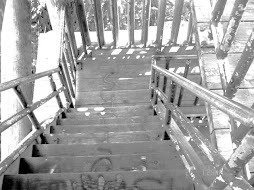It would seem that yet again that pervasive issue of the presence of religious symbols on government property has reared it's ugly head in another small town. As recorded in a recent Washington Post editorial titled 'The Seven Aphorisms,' the small town of Pleasant Grove City, Utah is being opposed by a minority colic group known as the Summum, who believe the town is unfairly favoring Christianity by choosing to maintian a "10 Commandments" monument while decling their offer to erect a monument commemorating their religious texts. The town's hall has been embellished with numerous historical and culturally relevant monuments for decades. According to the town, these monuments are placed for the specific purpose of commemorating the many historic forces that took part in it's formation and growth.
By description, this town appears to be like most others. It is a town that has been shaped by many contributing organizations and groups. One such institution that has had an immense part in forming this city is the church. This should come at no large surprise. The hand of the church in American community growth has proven common in most other American cities as well. Indeed, one would face a great challenge in seeking to find even one town in their travels across the U.S.A that does not contain at least one Christian church. It is an indisputatble fact that the Church has been among the strongest and most accomplished institutions in fostering positive community growth throughout American history. The town of Pleasant Grove City is undoubtedly no exception.
Yes, when one addresses the issue regarding the presence of religious symbols on public property, there are a host of considerations that need to be made. Some of these include freedom of expression, separation of church and state, religious discrimination and equal representation of social groups. One could discuss and debate these issues for hours on end, but unfortunately I don't have hours (you probably don't either) and I only wish to address a few undisputable facts that I believe play a large role in the understanding of this particular case.
The fact remains that the mainstream Christian church has for many centuries been and continues to remain an influential presence in the town of Pleasant Grove City. The disputed symbolic monument displays the 10 Commandments, which were (and believe it or not largely still are) absolutely foundational principles of American society. Pleasant Grove City's monument attests to this fact, having been erected on the property now for nearly half a century. Religion aside, there is enough empirical information here to prove the continued importance of this monument to the community as a representation of the town's orgin.
Have you ever heard of the Summum? Congratulations if you have, and don't feel bad if you haven't. The Summum is a marginal minority group that has only existed for a few decades in the town of Pleasant Grove City. Outside of the state of Utah, it is nearly unknown. The historical contributions to the town and the nations are inarguably minimal. Why then do they deserve a place on the Town Hall lawn? If every minute special interest group were to be granted representation at their town hall, undoubtedly the lawn itself would soon be invisible under the piles of potential monuments that could be erected. Relevance and practicality should be the deciding factors in such debates of symbolic display on public property. Sorry Summom, but the line needs to be drawn somewhere.
Monday, November 17, 2008
Subscribe to:
Post Comments (Atom)

No comments:
Post a Comment